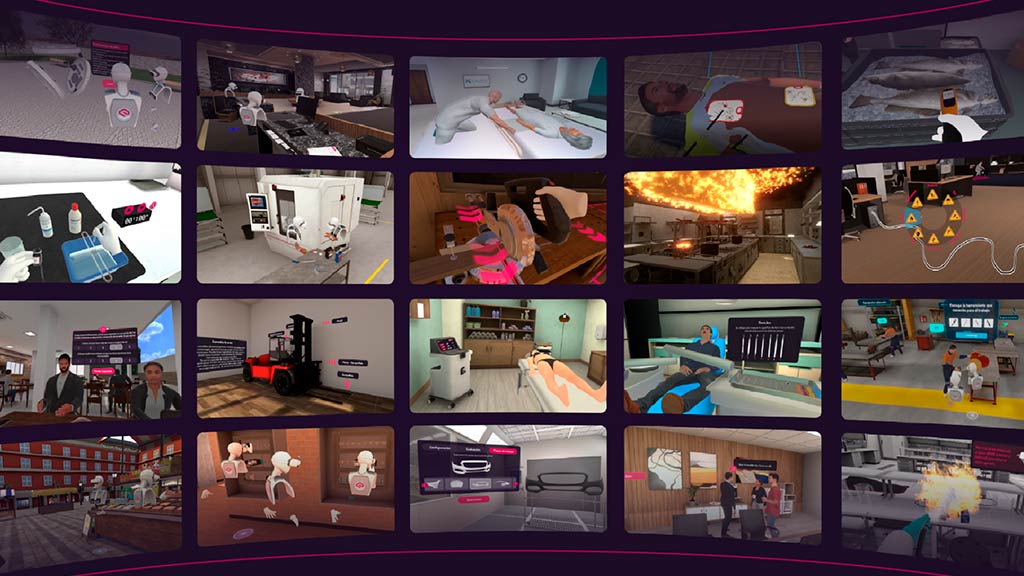In a world where digitalisation and new technologies are transforming education, Virtual Reality has established itself as a key tool in Vocational Training.
Virtual Reality simulators have revolutionised training in different sectors and allow students to face realistic scenarios without risk, optimising learning through practice in safe environments. From industry to healthcare, energy to retail, VR has become a great ally of educational innovation.
However, not all solutions are the same, and many educational centres have focused their efforts on installing immersive rooms without considering a fundamental aspect: the content that feeds these platforms. Without a variety of simulators aligned with the curriculum, the investment in these rooms loses much of its educational value.
Virtual Reality in Vocational Training, more than an immersive experience
Investing in technological infrastructure is only the first step. For an immersive classroom to be truly effective, it must be supported by a wide range of simulators adapted to the training needs of the students. The diversity and specialisation of the content is what allows Virtual Reality to go from being a simple attractive tool to becoming a profitable educational methodology.
Therefore, what really makes the difference is the quantity and quality of the training content available, which is a differentiating factor when it comes to choosing the right technology company to go hand in hand with.
This offer of Virtual Reality content must be based on a series of criteria in order to be attractive and productive for Vocational Training centres:
1. Adaptability to different areas of knowledge
Each professional family has specific needs. Training an industrial maintenance technician is not the same as training a healthcare professional. A wide catalogue of simulators allows us to cover all specialities, ensuring that each student receives practical training relevant to their future career.
2. Risk-free practical experience
Many industries require skills that can only be acquired through practice. However, in the real world, practising with industrial machinery, chemicals or medical procedures can be costly and dangerous. Virtual Reality allows students to repeat exercises until they perfect their skills without risk to their safety or equipment.
3. Learning based on repetition and objective assessment
Hands-on learning is based on repetition and feedback. VR simulators allow unlimited repetition of procedures and facilitate objective assessment of students’ performance, providing clear metrics on their progress.
4. Greater return on investment in immersive rooms
Immersive rooms represent a major investment for schools. If only a few simulators are available, their use is limited to certain groups of students and their full potential is not realised. A broad catalogue of simulations ensures that the rooms can be used consistently by different training areas, thus maximising their cost-effectiveness.
Therefore, when choosing a Virtual Reality solution for VET, it is key to consider not only the infrastructure, but also the available content ecosystem.
Beyond technology, content is the key
As a leading company in the implementation of Virtual Reality solutions in the education sector, at Innovae we differentiate ourselves by having the largest range of simulators on the market, which allows centres to access specific content for all professional families, guarantee practical training aligned with the needs of the labour sector and make the most of their immersive rooms.
Our simulator offer includes different areas:
- Industry: Mechanical Manufacturing, Electric Car, Lift Mechatronics, Forklift Truck…
- Energy: Electrical Panels, Transformer Substations, Medium and High Voltage Works, Wind Turbine…
- Chemistry: Biochemistry Laboratory, Pharmaceutical Laboratory, Chemical Laboratory Safety…
- Technology and Technical Skills: 3D Animation, Computer Systems and Network Administration, Gardening and Forestry Tools, Carpentry Workshop…
- Public Services and Retail Trade: Tourist Services, Hotel and Catering Services, Food Handling, Commercial and Warehouse Activities, Hairdressing and Beautician…
- Health and Social Services: Nursing Assistant, Diagnostic Imaging, Oral and Dental Hygiene, Health Emergencies…
- Safety and Work Orientation: First Aid, Fire Fighting, Plant Safety, Job Interview, Communications and Presentations in Public…
The world of work is constantly evolving, and training must adapt to these changes. That is why at Innovae we are committed to continuous innovation, developing new simulators that respond to market demands and updating existing ones with constant improvements.
This strategy allows educational centres to always have the latest generation tools, aligned with the trends and regulations of the sector. In addition, we work in collaboration with experts in each area to guarantee maximum fidelity and realism in our simulators.
Virtual Reality has proven its value in vocational training, but its effectiveness depends largely on the content available. It is not enough to have state-of-the-art immersive rooms; a diverse and quality ecosystem of simulators is necessary to ensure complete hands-on training.
Our competitive advantage lies in the breadth and specialisation of our simulators, allowing each school to get the most out of their Virtual Reality investment. When choosing a VR solution for vocational education, the key question is: how many and what kind of simulators are available? Because in the end, technology without content is just an empty promise.


